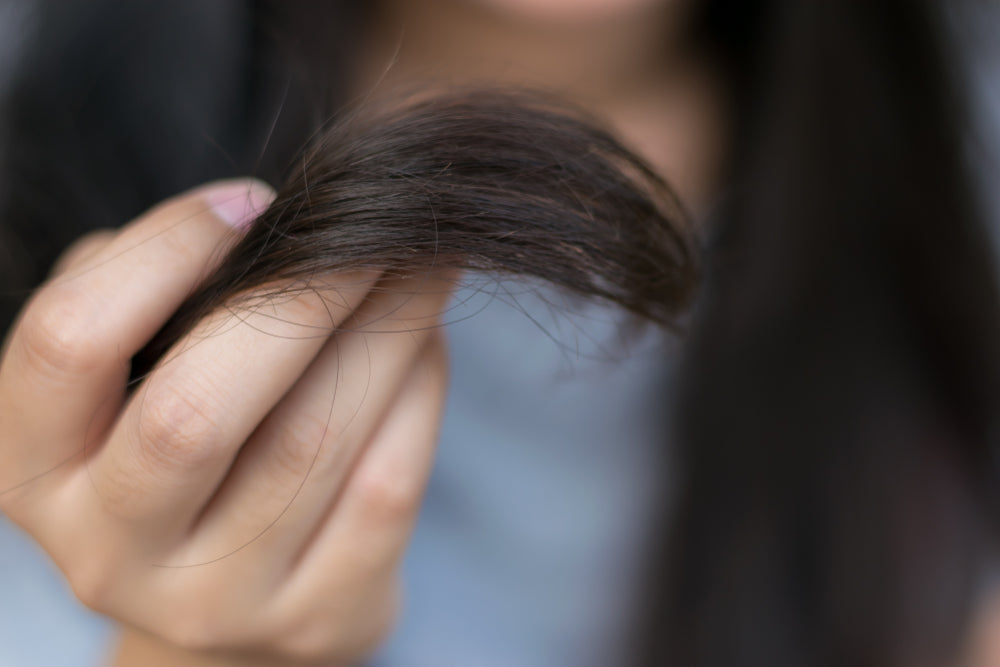When it comes to promoting healthy hair growth, a well-nourished scalp is vital. That’s why an effective way to maintain scalp health is by incorporating scalp oils into your hair care routine. Still, with so many products available, it can be hard to figure out which scalp oil is the best for you. So, in this article, I’ll provide a detailed guide to help you determine how to choose a good hair growth serum and which kind of oils and serums are best for your scalp.
The Relationship Between Scalp Oil and Hair Growth
Everyone’s scalp produces a natural oil called sebum, which nourishes and moisturises your scalp's microbiome and strengthens your hair follicles. However, some find that their scalp needs extra support due to scalp conditions or dryness; this is where scalp oils come in. Natural scalp oils and serums can be made from a variety of plant extracts, such as olive, coconut, jojoba or avocado oil, and they can be of huge benefit to overall scalp and hair health. This is because these oils can sink into the scalp’s layers and provide the hair follicles with crucial minerals and nutrients. As a result, these added vitamins can promote better hair growth and combat itchiness, dryness, breakage and thinning.

Factors to Consider When Choosing a Scalp Oil for Hair Growth
Everyone’s scalp and hair are different, which is why it’s good to understand what your individual needs are before choosing a hair growth oil. Here are some key factors to think about before making a decision:
Ingredients: It’s always a great idea to check the ingredients in hair growth products before buying them. In some cases, they might contain chemicals that damage the scalp over time or substances that cause irritation or inflammation in certain individuals. If you have a particularly sensitive scalp, making your own oil is a safe way of controlling all the ingredients before applying them to the skin.
Your Scalp Type: Understanding your own scalp is vital before choosing an oil - that way, you can select the best hair growth oil for your personal needs. For example, if you typically have an oily scalp, using products with lighter oils may be best. However, if your scalp struggles to lock in moisture, thicker oils such as coconut or argan might work best for you.
Residue and Absorption: Determine how easily the scalp oil absorbs into the scalp and hair without leaving a greasy or heavy residue. Ideally, you'll want a scalp oil that penetrates the scalp without weighing your hair down or making it too greasy.
Existing Scalp Conditions: If you’re currently dealing with a scalp condition such as scalp psoriasis, dandruff or scalp eczema, choosing oils that target your symptoms is helpful. Look out for a soothing and natural scalp oil that can allow your scalp to heal while promoting hair growth.
Best Scalp Oils for Hair Growth
When choosing the best hair growth oil, it’s essential to understand how different oils can benefit your scalp and how to apply them. Let’s take a look at four popular oils that can soothe your scalp and encourage hair growth:
Peppermint Oil: this natural essential oil is a powerful tool for stimulating blood flow and circulation, leaving a refreshing and cooling sensation on the skin. Because it promotes blood flow, applying peppermint oil to the scalp can also strengthen hair follicles and lead to more hair growth. This potent oil is best used with a carrier oil, such as coconut, and can be massaged into the scalp to calm inflammation and itchiness.
Coconut Oil: Coconut oil is extremely nourishing and can add moisture to dry and flaky areas of the scalp. It also fortifies hair shafts, leading to less breakage and damage. This moisturising oil contains antimicrobial elements, which can help prevent and combat fungal infections and other scalp conditions. Coconut oil is non-irritating and soothing, so you can apply it directly to the scalp and leave it in overnight or for a few hours.
Rosemary Oil: Like peppermint oil, rosemary oil is also well-known for improving blood circulation. So, applying it regularly can stimulate hair growth by ensuring nutrients are delivered to the hair follicles. To use this oil, simply dilute it with a carrier oil and massage it into your scalp using your fingertips. Then you can leave it in overnight or for a couple of hours and wash it out with a gentle shampoo.
My Intensive Scalp Oil is made with all-natural ingredients that act as a nourishing formula for all kinds of hair. Made with argan and coconut oil, this intensive scalp remedy targets dryness and irritation, replenishing moisture levels and adding shine and vibrancy to your hair. This gentle oil is ideal for sensitive scalps, and its soothing blend of natural ingredients brings relief to itchy and inflamed areas.
Hair Growth Tips and Maintenance
Regular scalp massages are one of the easiest yet most effective ways of encouraging hair growth and maintaining good scalp health. These don’t take a lot of time or effort, and you can do it using just your fingers. Essentially, a scalp massage involves applying gentle pressure to your scalp using your fingertips and rubbing in circles or upwards/downwards strokes. Doing this regularly can benefit you by:
- Promoting relaxation and stress reduction
- Causing more blood flow to the scalp
- Releasing tension in the scalp
- Stimulating hair follicles
Incorporating Scalp Oil into Your Hair Care Routine
Incorporating scalp oil into your hair routine needn’t be a daunting task. In a few simple steps, I’ll show you how to get the most out of our scalp oil by using it regularly as part of your haircare regimen.
Pre-Shampoo oil: Most oils need to be washed out after application, so I recommend using our scalp oil on or before your usual wash day. Wet your hair and scalp, and then apply the oil with our useful nozzle feature or simply with your fingertips.
Massage: Squeeze the oil directly into your hair and rub it in gently using your fingers. However, if you prefer to use less oil, apply it straight to your fingertips and then massage it into your scalp. I created this oil specifically to target dry and inflamed scalps, so it’s suitable for all hair types and won’t cause discolouration.
Allow it to sink in: After massaging it gently, I recommend wrapping your hair in a towel and letting the oils penetrate your scalp for at least an hour to soften and soothe any rough or flaky areas. Still, for optimum results, it’s best to let the oil work on your scalp overnight.
Shampoo and condition: When you’ve let the oil sink into your scalp, it’s time to wash it out. Many of our customers with sensitive or irritated scalps like to pair our intensive scalp oil with our natural shampoo and gentle conditioner. We’ve made these with soothing plant-based ingredients that won’t worsen scalp conditions, making them perfect for a nourishing haircare routine.
Restoring your scalp’s health and growing your hair takes consistency and patience, but a scalp oil can help you achieve the results you’re looking for without causing damage. Also, it’s always important to be adaptable based on your individual needs. For instance, your scalp condition might be more severe, so you may need to use scalp oil more often than once a week. That’s why is essential to pay close attention to your hair and scalp and tailor your hair care routine accordingly.
I know that having an itchy or dry scalp can be extremely difficult to manage, which is why our scalp oil is formulated with gentle, calming botanicals to help you heal. For more chemical-free hair solutions, browse our natural haircare range.
